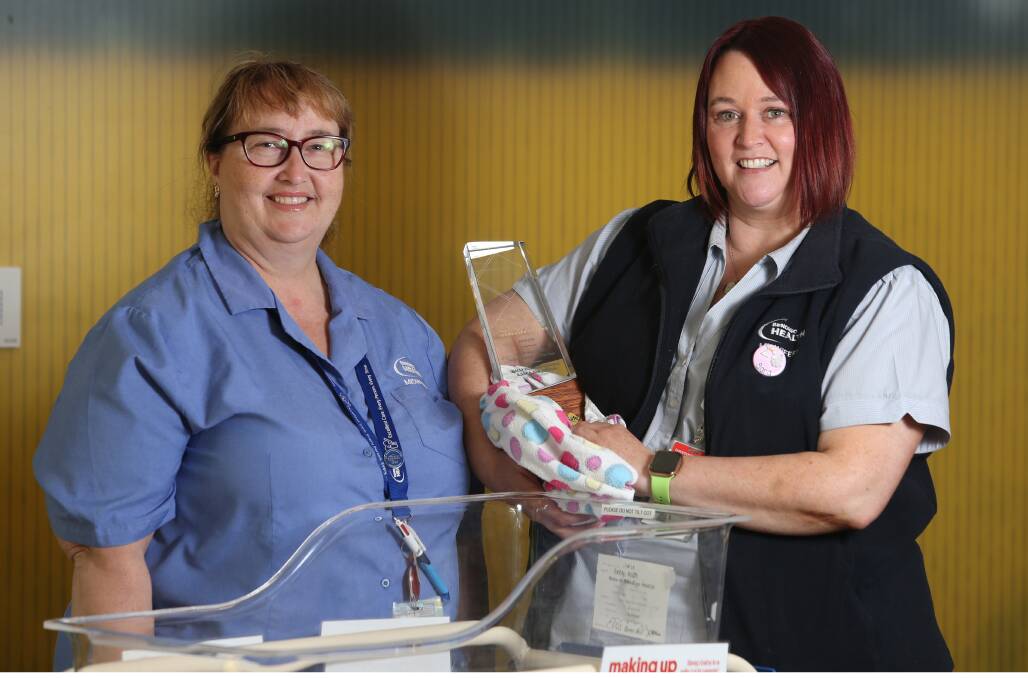
Bendigo Health midwives Sara Jorgensen and Sally Collier-Clarke have been recognised for the efforts in identifying stress, workload and staffing issues in their ward.
Subscribe now for unlimited access.
or signup to continue reading
After getting positive results thanks to discussions and working with Bendigo Health management, the midwives were named WorkSafe's health and safety representatives of the year.
But the midwives, who have a combined 35 years experience, insist there wasn't a hero moment.
"Sally and I think we haven't done anything out of the ordinary," Ms Jorgensen said. "We have just been supporting our staff and ourselves."
The pair became health and safety representatives on Bendigo Health's women's ward in late 2017 after feeling they weren't being heard on some issues.
"Pretty much, we didn't have anybody representing us and it was put forward by Australian Nursing & Midwifery Federation that somebody needed to represent us," Ms Jorgensen said.
"So I put myself forward and made sure Sally came along for the ride."
When Bendigo Health proposed a reduction of staff numbers on the night shift in the women's ward, Ms Jorgensen and Ms Collier-Clarke decided to speak up.
"They were also trying to make midwife managers run the whole unit, it was just (hard)," Ms Collier-Clarke said. "This is a massive unit that covers the birthing suites as well.
"So we had to prove it wasn't feasible because the stress and fatigue on the girls went through the roof. We had incident reports saying (staff were too) stressed, shifts were too busy, people were not getting meal breaks and were leaving late - the overtime was huge.
"We were at the stage where staff willing to resign senior positions, staff were ringing in sick and we were short staffed."
After initiating discussions with management, the pair set about collecting data to prove the stress and workload levels of staff.
"We went to management and sent our boss a message saying this isn't working, we need to talk," Ms Jorgensen said.
"From when the change of impact came out and our response, they wanted to go ahead, so we had a template going where the (staff) in charge put in where staff were called for emergencies, how may staff were on, how staff many couldn't fill positions plus the incident reports for overtime, stress and impacts on family.
"That was collected over a period of time. They decided to try it for a while and we ended up going to the executives with a PIN (provisional improvement notice)."
Bendigo Health chief executive Peter Faulkner said Bendigo Health has a number of avenues for staff to raise workplace concerns.
"Bendigo Health encourage all staff to present their workplace concerns and ideas for improvement to relevant management," he said.
"(There is) a number of avenues for people to do this including Open Office, which sees members of the executive team make themselves available for drop in chats on regular occasions.
"Bendigo Health has a continuous improvement culture and uses feedback from multiple sources, including patients and staff."
Ms Collier-Clarke said it was important staff in any job spoke up if something went wrong at a workplace.
She said their plight was helped by a support from their boss and co-workers
"Little voices go a long way but have to be prepared to follow through," she said.
"They said if we can get three or four from our designated working group to join it would be good but we had 90 people. Everyone was behind us.
"Our boss was really supportive but was bound by hospital guidelines, she's management and can only help us so far. But rest of staff 100 per cent behind us.
"If we don't have people speaking up, things go wrong. Anyone who wants to speak up should take the opportunity. A silent voice isn't heard."
Have you signed up to the Bendigo Advertiser's daily newsletter and breaking news emails? You can register below and make sure you are up to date with everything that's happening in central Victoria.


